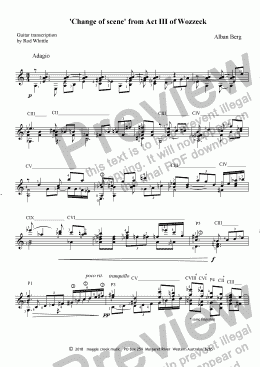Ready to print
You have already purchased this music, but not yet printed it.
This page is just a preview and does not allow printing. To print your purchase, go to the My purchases page in your account and click the relevant print icon.
'Change of scene' from Act III of Wozzeck (for solo classical guitar)

Already purchased!
You have already purchased this score. To download and print the PDF file of this score, click the 'Print' button above the score. The purchases page in your account also shows your items available to print.
This score is free!
Buy this score now
'Change of scene' from Act III of Wozzeck (for solo classical guitar)
$5.00
Instant download
You are purchasing high quality sheet music PDF files suitable for printing or viewing on digital devices.For solo classical guitar; 3 pp
Alban Berg (1885 -1935)
Berg was a student of Arnold Schoenberg, and came to prominence with compositions using the atonalism of that school. He incorporated chromaticism and an absence of tonality into his compositions with complete facility, if not to public acclaim. His creativity was interrupted by World War 1, during which he served in the Austrian Army. He returned to composition as a champion of modern music, with his opera Wozzeck (1923) bringing both fame and notoriety. He died of blood poisoning in 1935.
Over the past century dissonance increased in the compositions of serious music to a point where the semitones had equal value, which is harmonically a kind of wall. Berg was an early innovator. However, if when strictly followed such serialism reaches an ultimate dissonance that effectively sees off melody and harmony as emotional and structural entities, that still leaves elements around form, dynamics and rhythm for the purposes of expression, and these together with adroit note selection prove to be surprisingly potent for articulation and cohesion.
The Lyric Suite (1927), which uses Schoenberg's twelve-tone technique, is a case in point. The very name seems incongruous for an atonal work, yet lyric it is, and if the forms used are necessarily masked by the characteristics of serial writing they are not eliminated by them. In this excerpt a rondo form is used with the principle subject repeated on the third page (noted in the score) after a digression to more remote regions than this form usually adopts, due to the atonality.
As well, Berg's writing is rarely purely atonal. In fact the integration of consonant elements are one of the music's most alluring features. It would be so easy, one feels, for melodic material to coagulate the mix, but in his hands the very opposite is generated, an increased clarity of mood. The music remains consistent, as it should, and the incorporation of (often only relatively) thematic material, if often arresting after so much dissonance, doesn't always always mean less intensity or gloom. It is simply effective, either way.
Having said all that, it can hardly be denied that the substance of atonality (dissonance, clashing semitones, unharmonic bass) gives it a special suitability to express dark outlooks, and Berg is the author of Wozzeck and Lulu, no downtown musicals. It is hard to determine if Berg chose atonality because it could deliver the angst or because he was bored with obvious forms and romanticism. Probably both.



